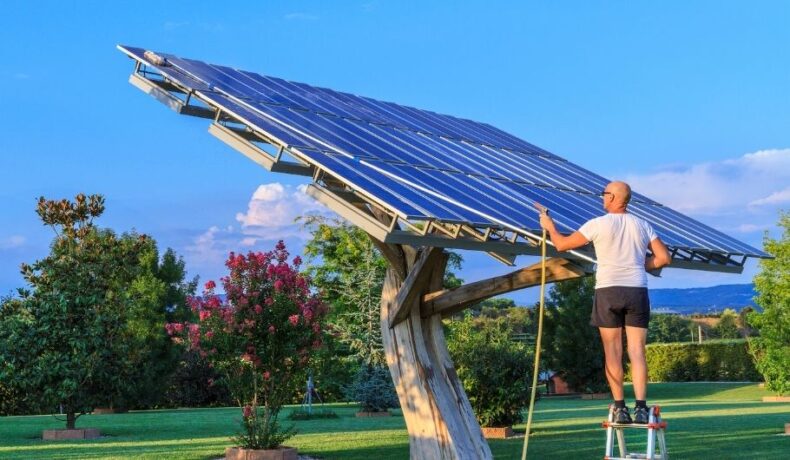It’s 6 am on a Sunday morning. You’re lying in bed, half-asleep, but you just can’t wait to kick off your day by getting stuck into some solar panel cleaning. Sound familiar? We didn’t think so.
Let’s be honest, the idea of cleaning solar panels isn’t exactly exciting, but they are a long-term investment. As such, they require long-term maintenance, especially if you want to get your money’s worth.
At some point, you’ll have to decide whether you want to go the DIY route or if you want to make extra room in your monthly budget for a professional solar panel cleaning company.
If you’ve chosen to go the DIY route, there is plenty to consider:
- How should you clean your panels?
- Does rain help at all?
- What detergents, if any, should you use?
- How often should you clean your panels?
Unfortunately, when it comes to cleaning solar panels, there’s a lot of false information out there.
This is why we’ve decided to do a deep dive and gather all of the necessary information on solar panel cleaning on your behalf.
Table of Contents
How To Clean Solar Panels
Pre-Cleaning Steps:
1. Gather Your Cleaning Materials
This will include the following:
- Extendable poles
- Pressurized hose or water-fed pole
- Soft brushes. These can come as a separate attachment to your poles or as a combo.
- Angle adapters for your poles
- Anything else you may require
(Do NOT use abrasive materials, this will void your warranty)
2. Choose Your Time Of Day
Before you get stuck in, choose the right time of day. Solar panel cleaning should take place in the early morning or evening. Alternatively, when temperatures are below 95 degrees Fahrenheit (35 degrees Celcius)
3. Take Safety Precautions
Take all the necessary safety precautions, particularly if you work on the roof (use safety ropes or harnesses if necessary). Ensure all of your equipment is in working condition, i.e., ladders, ropes, etc.
4. Prep Your Cleaning Solution
Pure water, remember? If you don’t have access to this, hook your hose up to any rainwater collector that you may have. As a last resort, use your regular water, but again, this is not advised. (No soaps, no detergents!)
5. Bleed Your Hose
Run the water out of your hose for a bit before using it. Water that has been sitting in a hose for some time can either be too hot or too cold, depending on recent temperatures. This will prevent your panels from going into thermal shock.
6. Prep Your Panels
Spray them with a light mist of water before cleaning them. This will get them up to temperature.
Cleaning Steps
1. Pre-Rinse
The pre-rinse will rinse off that top layer of dirt, dust, and debris. The water will sit there and soak into all the hard elements that are difficult to scrub off.
You might even want to let the water sit on the solar panels for 5-10 minutes to let it soak into those hard elements to let them soften up. This will make the scrubbing a lot easier
2. Scrub
Next, you’ll want to conduct a soft yet abrasive scrub. You don’t want to scrub too hard as solar panels have an anti-reflective coating that you don’t want to scratch.
Ideally, you’ll want to do this step with a soft, water-fed brush.
3. Final Rinse
Now you’ll need to follow up with a final rinse.
This will push the remaining dirt, dust, and debris off of your panels.
If you don’t do this final rinse after doing the soft abrasive scrub, you may find leftover dirt and dust in the water on your panels.
4. Drying
If you have used pure water to clean your solar panels, you can let them dry naturally. This is because pure water leaves behind no residue or water impurities.
Unsightly watermarks are a thing of the past!
What Are The Best Cleaning Agents For Solar Panels?
Contrary to much of the information out there, you do not need to use any form of special soap, detergent, or bleach when cleaning solar panels; it simply isn’t necessary. In fact, you should avoid it.
Soaps can leave a film or residue that encourages dirt to stick and build up quicker. Worse yet, using a harsh chemical agent while cleaning solar panels can cause scaling. This can potentially work its way under the frame and damage the silicon.
If not soaps or detergents, then what?
Pure Water
What you really want to use is pure water. You can do this by using a deionization (DI) unit, reverse osmosis (RO) unit, or a combo (DI/RO) filter.
These units excel at removing contaminants and minerals from water.
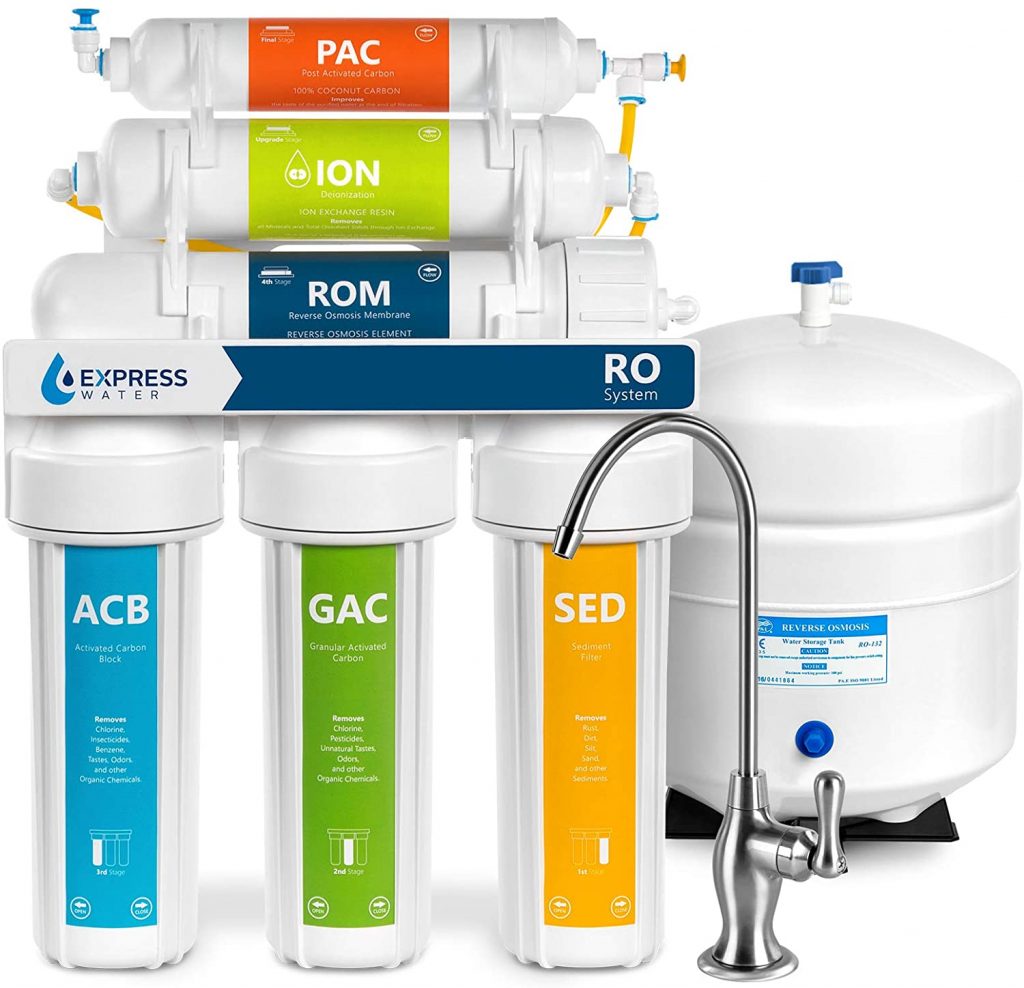
Click here if you want to purchase it from Amazon.
Deionization
Deionization (DI) removes total dissolved solids (TDS) from water using ion-exchange resins. This controls the electric charge of ions in the water to remove the TDS.
Reverse Osmosis
Reverse Osmosis (RO) works by using a high-pressure pump to increase the pressure on the salt side of the RO and force the water across the semi-permeable RO membrane. This leaves almost all (around 95% to 99%) of dissolved salts behind in the reject stream.
Role of DI and RO
Both deionization and reverse osmosis help to alter hard water (water with a significant amount of dissolved minerals) into water appropriate for solar panel cleaning.
This is necessary because the minerals in hard water can leave behind a residue on the panels. This causes stains or scaling that damages the panels and reduces the amount of sunlight being absorbed.
Alternative Options
But what if you don’t have the budget for these filtration systems?
You can use rainwater or tap water with low mineral content and a total hardness that is less than 75 ppm.
Ideally, though, you want water with a TDS of 0-30ppm for cleaning your solar panels. You can measure this with a TDS meter.
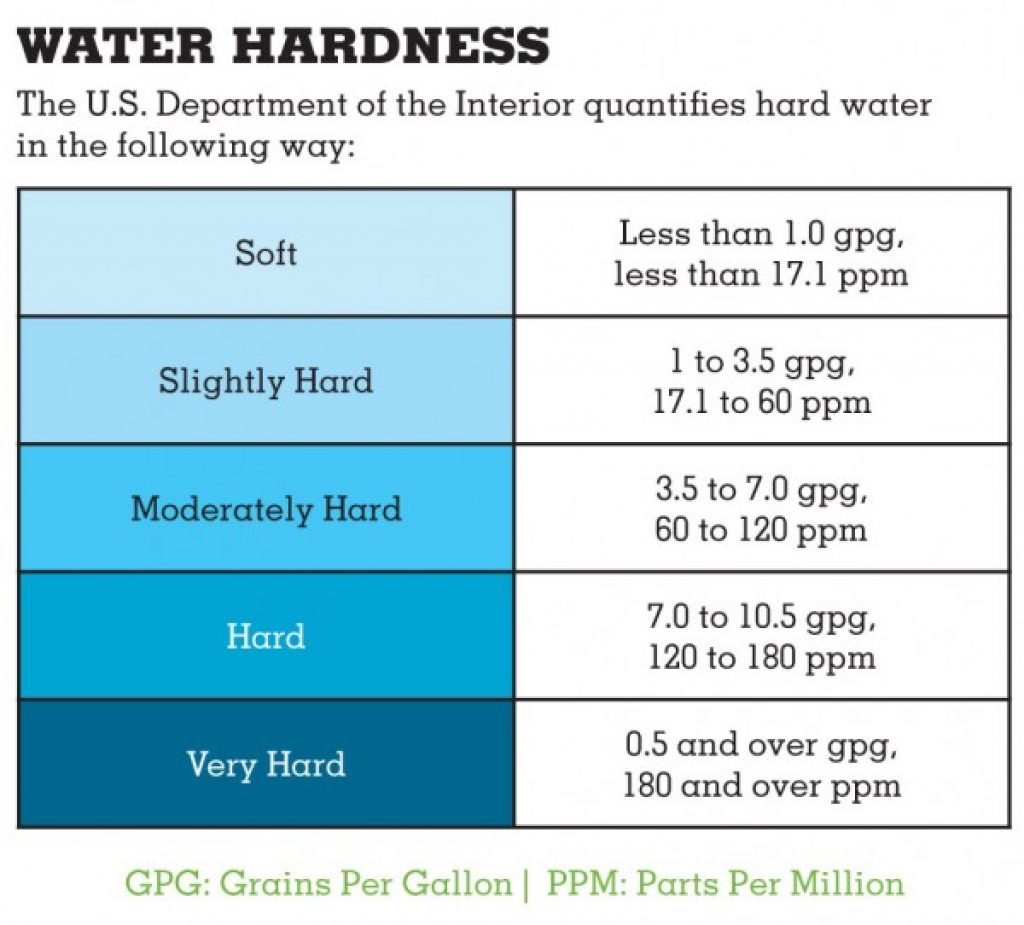
Water Pressure
Watch out for your water pressure; most manufacturers recommend nothing more than 40-50 lbs of pressure on PV modules. Any more can cause microfractures and/or damage the joints in the panel frame.
Water Temperature
The temperature of your water is vital when cleaning solar panels. This is because they are vulnerable to thermal shock damage.
Thermal shock damage occurs as a result of a sudden change in temperature.
Ideally, you want the temperature of your water to be similar to the temperature of your panels at the time of cleaning.
If the temperature difference is too great, you will increase the likelihood of your panels cracking or shattering.
The Proof Is In The Pudding
If you STILL aren’t convinced that pure water is the way to go, then take note of the following:
U.S.-based solar maintenance companies like Bland Company and Premier Solar Cleaning use deionized water with a rolling or vehicle-mounted brush to clean solar panels.
This allows them to do without the need for soap or harsh detergents. This is because soap leaves a residue that not only shades panels but attracts dirt.
Related reading: Solar Panel Dimensions Chart
Is Cleaning Your Solar Panels Necessary?
It’s vital that regular maintenance is carried out on your solar system — this includes cleaning.
Regular maintenance will ensure that your panels operate correctly, safely, and efficiently.
Dust, debris, vermin, bird poop, hail, snow, water stains – all of these elements your panels will have to deal with. Each of them can damage your PV system.
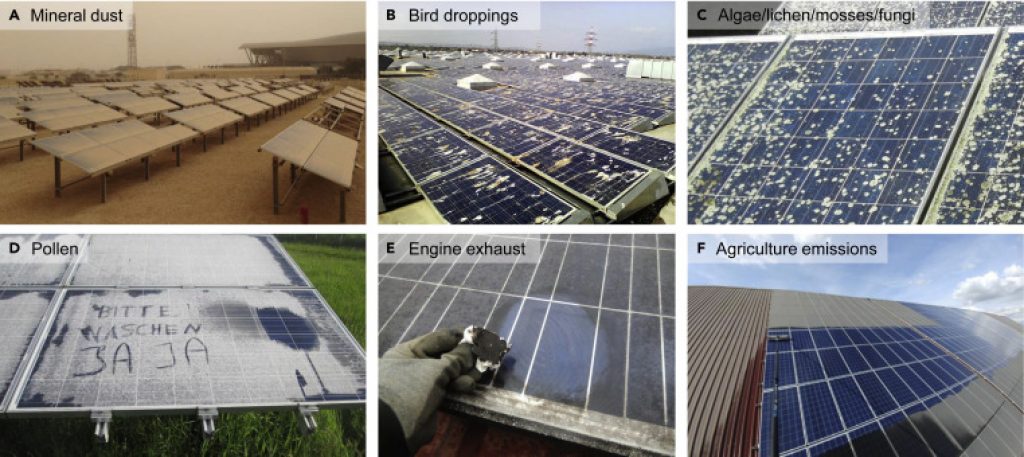
The following scientific experiments demonstrate the effect that dust can have on solar panel efficiency:
S.A. Sulaiman et al.
Experiment
Analyzed the effects of dust on the performance of PV panels by using artificial dust (mud and talcum) particles on solar panels.
Result
Reduction in the peak power generated can be up to 18%. The accumulated dust on the surface of photovoltaic solar panels can reduce the system’s efficiency by up to 50%.
F. Mejia et al.
Experiment
Conducted an experiment on the effect of dust on solar photovoltaic systems. Soiling losses have their largest impact during the long dry summers.
Result
The losses caused by dust accumulation were estimated to be -0.0021 per day in relative solar conversion efficiency. After the rain event in the fall, the efficiency increased to 7.1%, a similar value to that observed in the spring, further suggesting that dust had accumulated on the site.
D.S. Rajput et al.
Experiment
Studied the electrical performances of photo-voltaic panels for the effect of deposited dust particles.
Result
Results showed the following: maximum efficiency of 6.38%, minimum of 2.29% without dust, maximum efficiency of 0.64%, and minimum 0.33% with dust.
Does Rain Help Clean Your Solar Panels?
Years ago, many people, including some solar panel manufacturers, would happily tell you, “don’t use anything but rainwater.” Sadly, many solar panel owners took that information and ran with it.
While rainwater can rinse your solar panels somewhat (especially if they have a significant tilt), it is not capable of doing a good enough job on its own.
Not entirely convinced? Let’s use an analogy involving a car.
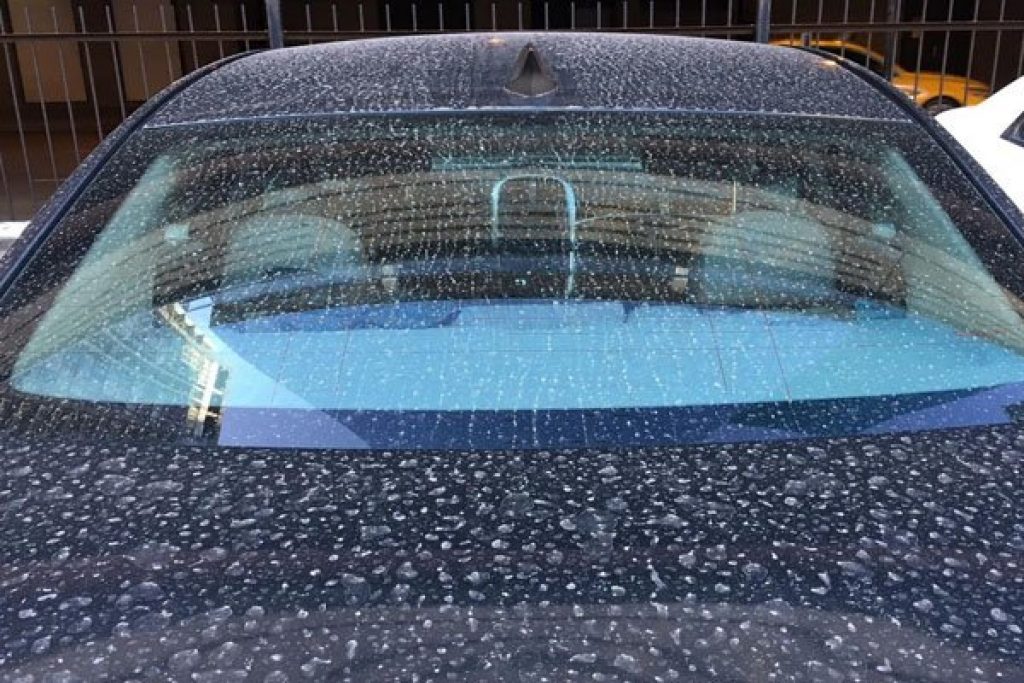
If a car is dirty and has been standing outside for some time, what would it look like after rainfall? The answer – not that much better.
Why? Because even though some of the dirt has been washed away, most of it will have just shifted to different areas of the car.
All of that dirt will accumulate and turn into muddy streaks that run down and stick to the outside of your car. The exact same thing happens to solar panels.
During rainfall, the dust and dirt begin to shift further down your solar panels, causing streaks. Even worse, it accumulates at the bottom of the solar panels, obstructing the lower cell row and hindering production efficiency.
Sure, very heavy rain may help a little bit more, but it is not a substitute for mechanical solar panel cleaning.
How Frequently Should You Clean Solar Panels?
Most professionals or manufacturers will tell you to clean your panels approximately every 6 months.
While this is a helpful guideline, the truth is that location dictates everything.
There is no one-size-fits-all approach when it comes to solar panel cleaning frequency. You need to consider your immediate environment as well as the harshness of the seasons in your area.
For instance, a solar system close to the sea will require more cleaning due to the salt crust that forms on outside surfaces.
Your panels will also require extra cleaning if you’re in a particularly pollen-heavy area.
In the end, be mindful of the outside conditions and pay attention to general surfaces that are exposed to the elements. If things are looking very dirty, chances are your solar panels will be too.
Note to our readers: The best time of day to clean solar panels is in the morning or early evening when they are at a cooler temperature.
Should I Clean Them Myself Or Call Professional Solar Panel Cleaners?
While some of you enjoy going the DIY route, many would rather rely on professional solar panel cleaners.
In doing so, your solar panels are guaranteed to receive the best treatment out there. But how do you decide between the two?
Here are some things to consider:
Time Constraints
What does your schedule look like and how much free time do you have available? Cleaning solar panels is not something that you want to rush. If you don’t have the time to get the job done properly, get in touch with your local professionals.
Finances
What does your monthly budget look like? If you won’t compromise yourself financially, then it is advised to call in the experts.
Safety
Safety is so important when it comes to cleaning solar panels, as it can be hazardous, particularly when rooftop panels are involved. There is no point in having a great PV setup if you end up in a hospital while trying to clean it.
So before deciding on the route, you’d like to go, consider your age, how sprightly you are, and the setup you have – do you have ground-mounted or rooftop panels?
The answers to those questions will go a long way in determining which route is best suited to you.
Related reading: 5 Best SunPower Solar Panels You Can Buy
Solar Panel Cleaning Tips
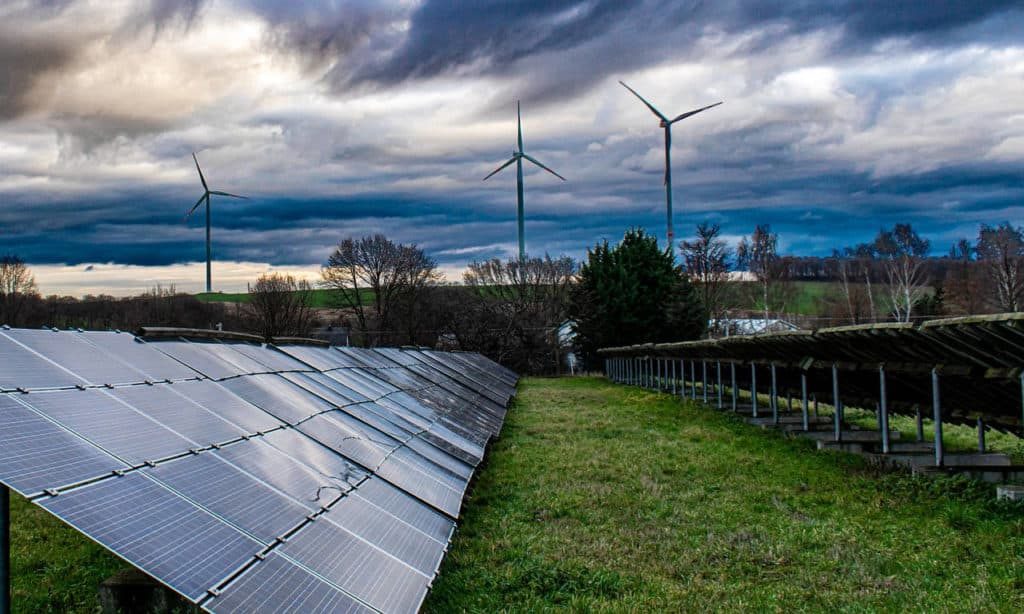
Time Of Day
Choose an overcast day or a time early in the morning or later in the evening to clean your panels.
Temperature
If you can’t clean during those times, pay attention to the outside temperature when cleaning. Stop when it hits 95-105 degrees Fahrenheit (35-40 degrees Celcius). These temperatures put your panels at a higher risk of cracking.
Hose Temperature
Let the water bleed through the hose first before you use it. Water that has been sitting in your hose can either be too hot or too cold. Letting it bleed will allow it to reach a more regulated temperature.
Safety
Particularly when it comes to rooftop panels, make sure that your ladder is secure before climbing it. Safety ropes or a harness are also a good idea, as rooftops can become slippery.
Slow Down
Spray your panels with a light mist of water to get them up or down to the correct temperature before cleaning.
Related reading: Solar Panel Racking (All you need to know about mounting)
Final Thoughts
Cleaning solar panels can be a bit tedious, but as previously mentioned, you want to ensure that your panels are consistently firing on all cylinders.
With a little time and effort, you can go to bed at night knowing that you are steadily earning your money back from what is a truly wonderful, long-term investment.
We hope that this article has gone some way in alleviating any of your concerns when it comes to solar panel cleaning.
If you have any further questions, please feel free to include them in the comment section below!

